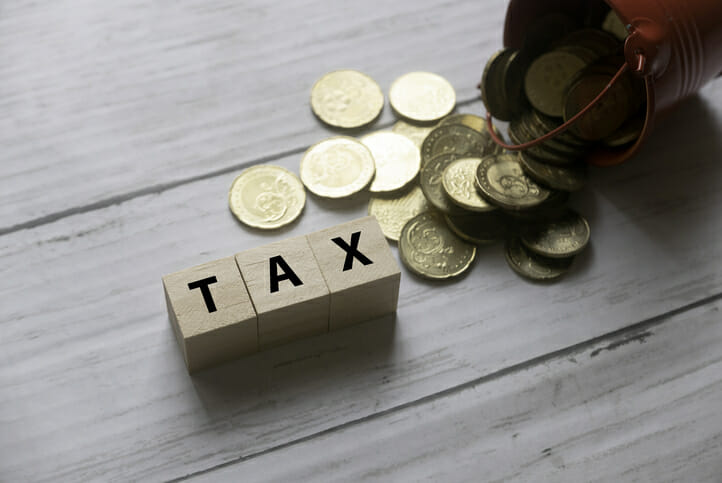If you invested in gold and sold it for a profit, you’re probably looking for ways to minimize your tax bill. After all, smart tax planning is a contributing factor when it comes to the overall success of your investing strategy. And while you can’t avoid capital gains tax on gold, there are ways to minimize your capital gains taxes overall. Here are some common strategies that investors use to minimize capital gains taxes on gold.
A financial advisor could help you optimize your investments to minimize your tax liability.
Capital Gains Tax on Gold
When you sell gold for a profit, whether it’s in the form of coins, bars, ETFs or mining stocks, you may be subject to capital gains tax. The IRS classifies physical gold and other precious metals as collectibles, which means they are taxed at a higher maximum rate than traditional investments like stocks or bonds. Depending on how long you’ve held your gold, gains may be taxed as either short-term or long-term capital gains, with different implications for your overall tax liability.
The IRS breaks down these profits into two categories:
- Earned income: Any money you make based on work for which you then get paid. This includes hourly wages, salaried pay or pay in exchange for products that you create.
- Capital gains: Any money that you make from selling an asset, financial or otherwise. This is defined as the value that the asset gained based on changes in the overall market without labor on your part.
The IRS applies both of these definitions to different types of financial investments, including rental properties. The agency will make you pay taxes on income earned from rents and capital gains on the profits from the sale of the investment property.
As an investor, you should note that capital gains are taxed at a different, much lower, rate than earned income. This is called the capital gains tax. And since gold is an investment asset, when you sell your gold and make a profit, it’s taxed as capital gains. However, depending on how you hold your gold, you will either have to pay taxes at the ordinary capital gains rate or a general rate of 28%. (More about that below.)
The IRS does not treat gold as a special class of asset. This means that no specific rules apply to gold when it comes to capital gains taxes. If you’d like to minimize your tax bill, the best way to do so is through smart overall tax planning.
Tax Planning for Gold Investments

Investing in gold can be a strategic way to preserve wealth and hedge against inflation, but understanding the tax implications is crucial to optimizing your returns. Whether you hold physical gold, exchange-traded funds (ETFs) or mining stocks, each investment type carries distinct tax treatments that can impact your overall profitability. There are five common strategies you can take to minimize capital gains taxes on gold.
1. Avoid Physical Assets
There are several ways that you can invest in gold, but investors will often invest directly in what’s known as “gold bullion.” This just means that you own literal, physical quantities of gold.
As an alternative, you can also invest in products that invest in physical bullion, effectively purchasing the metals on your behalf. For example, you can buy an ETF that holds quantities of physical gold in its portfolio. In this case, you will own gold bullion by proxy.
Ordinarily, long-term capital gains are taxed in three brackets: 0%, 15% and 20%. Here are the long-term capital gains tax rates and brackets for 2026:
| Tax Rate | Individuals | Married Filing Jointly | Head of Household | Married Filing Separately |
|---|---|---|---|---|
| 0% | $0 – $49,450 | $0 – $98,900 | $0 – $66,200 | $0 – $49,450 |
| 15% | $49,450 – $545,500 | $98,900 – $613,700 | $66,200 – $579,600 | $49,450 – $306,850 |
| 20% | $545,500+ | $613,700+ | $579,600+ | $306,850+ |
However, the IRS considers physical quantities of metal to be “collectibles.” For collectibles, such as coins, art and bullion, the standard long-term tax rate is 28%. As a result, owning physical gold, or owning funds that themselves own physical gold, means that you can pay a higher maximum capital gains rate of 28%.
The best way to avoid this is to invest in funds and assets but do not buy physical gold. A particularly good approach is to seek out ETFs and mutual funds that specify this approach in their investing. Assets such as futures contracts and options are not considered physical asset investments, so the IRS treats them as ordinary capital gains with a maximum 20% rate (plus the 3.8% net investment income tax, if applicable).
2. Hold Your Investments for at Least One Year
You may consider holding on to your assets for at least a year before selling them. If you sell an investment 12 months or less after buying it, the IRS considers it a short-term capital gain. These are taxed as ordinary income, meaning that your profits won’t qualify for the special, lower long-term capital gains tax brackets.
Here are the ordinary income tax rates and brackets for 2026:
| Rate | Single | Married, Filing Jointly | Married, Filing Separately | Head of Household |
|---|---|---|---|---|
| 10% | $0 – $12,400 | $0 – $24,800 | $0 – $12,400 | $0 – $17,700 |
| 12% | $12,400 – $50,400 | $24,800 – $100,800 | $12,400 – $50,400 | $17,700 – $67,450 |
| 22% | $50,400 – $105,700 | $100,800 – $211,400 | $50,400 – $105,700 | $67,450 – $105,700 |
| 24% | $105,700 – $201,775 | $211,400 – $403,550 | $105,700 – $201,775 | $105,700 – $201,750 |
| 32% | $201,775 – $256,225 | $403,550 – $512,450 | $201,775 – $256,225 | $201,750 – $256,200 |
| 35% | $256,225 – $640,600 | $512,450 – $768,700 | $256,225 – $384,350 | $256,200 – $640,600 |
| 37% | $609,351+ | $768,700+ | $384,350+ | $640,600+ |
3. Use Retirement Accounts
Investing in gold through retirement accounts such as individual retirement accounts (IRAs) can be a strategic way to manage capital gains taxes. When you buy gold within these accounts, you’re not subject to capital gains taxes on the appreciation of the gold as long as it remains inside the account. This allows the investment to grow tax-deferred until withdrawals begin at retirement age.
Withdrawals from traditional retirement accounts are taxed as ordinary income, not as capital gains. This means that the potentially high capital gains rate that could apply to the sale of gold outside these accounts does not affect your retirement withdrawals. You should note that the retirement account needs to be set up to handle physical gold investments, as not all IRA custodians offer this option.
If you are considering this option, make sure you understand the specific rules that apply to gold IRAs. These include requirements about the purity of the gold and storage stipulations. Failing to adhere to these rules can lead to tax penalties.
4. Gift Gold
Gifting gold to family members or charities can also be another effective way to avoid capital gains taxes. When you gift gold, any unrealized gains are transferred with the gift, and you do not have to pay capital gains taxes at the time of the transfer. The recipient assumes the original cost basis and holding period of the gold.
For family members, if they later sell the gold, they would be responsible for the capital gains taxes based on the original purchase price, not the value at the time of the gift. This strategy can be particularly advantageous if the recipient is in a lower tax bracket. However, there are limits to consider, such as the annual gift tax exclusion, which is $19,000 per recipient in 2026. Gifts beyond this amount may require filing a gift tax return and potentially reduce the giver’s lifetime estate and gift tax exemption.
Charitable gifts of gold are another option. If you donate gold to a qualified charity, you can generally deduct the fair market value of the gold at the time of the donation without having to pay capital gains taxes on any appreciation. This can both reduce your taxable income and allow you to support a charitable cause with a potentially valuable asset.
5. Use Tax-Loss Harvesting
Tax-loss harvesting manages taxes by offsetting the capital gains realized from selling profitable investments with losses from other investments. If you have gains from selling gold, you can offset these gains with losses from other investments like stocks or bonds. This can be particularly useful in years where your gold investments have performed well, and other parts of your portfolio have not.
To implement tax-loss harvesting, you must sell the losing investments and simultaneously realize the loss. You can then use these losses to offset an equal amount of gains. If your losses exceed your gains, you can use up to $3,000 of excess loss to offset other income, such as wages or salaries, and carry forward additional losses into future tax years.
It’s important to note the wash-sale rule, which prohibits you from claiming a tax deduction for a security sold at a loss if a substantially identical security is purchased within 30 days before or after the sale.
Bottom Line

The IRS taxes capital gains on gold differently than most other investment assets, treating physical gold as a collectible rather than a standard security. As a result, if you have bought physical gold, you’ll likely owe a higher capital gains tax rate of up to 28% when you sell. By contrast, other gold-related investments may be subject to the ordinary long-term capital gains rates. In addition, holding gold investments for at least one year before selling can prevent the gains from being taxed at higher ordinary income tax rates.
Tax Planning Tips
- A financial advisor can help you create a financial plan. Finding a financial advisor doesn’t have to be hard. SmartAsset’s free tool matches you with vetted financial advisors who serve your area, and you can have a free introductory call with your advisor matches to decide which one you feel is right for you. If you’re ready to find an advisor who can help you achieve your financial goals, get started now.
- If you want to figure out how much you will have to pay in capital gains, SmartAsset’s free calculator can help you estimate taxes for your area.
Photo credit: ©iStock/alfexe, ©iStock/Mohamad Faizal Bin Ramli, ©iStock/Pra-chid
